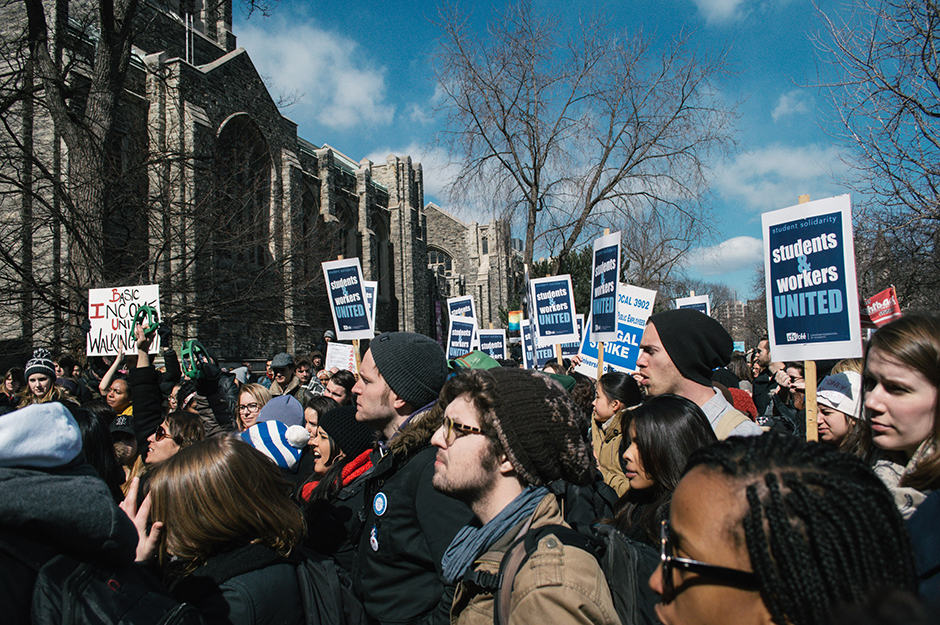After three weeks of picketing, the strike has not yet concluded.
CUPE 3902 Unit 1, which represents some 6,000 teaching assistants (TAs), exam invigilators, and other academic staff, voted down an agreement early Monday morning.
The vote count was reportedly 1,101 no to 992 yes, with 27 disallowed and 4 spoiled.
“Members of the bargaining team brought this offer to members with the belief it at least began to address the many issues we have raised in this round of bargaining. While we are very close to an agreement, the margin of votes shows that our members clearly feel the University has a ways to go to address those issues,” said Erin Black, CUPE 3902 chair in a statement.
“Simply put, U of T needs to tell our members-in writing-what their per member benefit will be under their proposal. I feel the members would be prepared to support an agreement that contained such an assurance from the employer,” added Ryan Culpepper, CUPE 3902-1 vice-chair.
Negotiations were held throughout the past week, with the university and the union reaching a tentative agreement on Wednesday, March 18. CUPE 3902 then voted to send the tentative agreement for ratification on Friday, March 20.
Unit 1 went on strike in the early hours of February 27, when the union did not approve a last-minute deal that the university proposed. Since that time, the union and the university declined to accept proposals put forward by the other side, before voting on the current rejected agreement.
So far, academic activities have been disrupted with classes, labs, and tutorials cancelled or post-poned. The Varsity received reports of classes that were held on picket lines and off campus. Courses that continue on campus struggle with the labour shortage, with some students running informal study sessions to make up for lost reading analysis, professors changing syllabi in the absence of TAs to grade assignments, and instructors from other units filling in for the strikers so the students could obtain their credits.
“We continue to be in close contact with the Provincial Mediator and remain committed to finding a solution to this impasse that would end the strike and allow affected students to complete their academic term without further disruption,” said Angela Hildyard, U of T vice-president, human resources & equity, in a statement.
The strike has made waves that reached the undergraduate population. Some continue to wear pins and CUPE 3902 hats to show support, and some students in campus leadership positions signed off on a letter to the unionized TAs, encouraging them to vote against the agreement, but stating that they would respect any decision the membership made.
The letter acknowledges the effect of the strike on undergraduates, and says that the disruption caused by the strike is testament to the “value and import of Unit 1 members to undergraduate education.”
“[Approving the agreement] would mean that, we have rewarded the university for its inaction. We pay thousands of dollars each year to the University of Toronto, expecting that some of it go to those who teach us and we expect the university to be held to account for not living up to this expectation,” a portion of the letter reads.
Last week, students at UTM, UTSC, and St. George walked out of their classes as a show of support for the strike. On Tuesday, March 17, academic officials at UTSC wrote to Provost Cheryl Regehr, urging her to negotiate.
A quieter minority of students condemned the strike on social media.
The record for the longest strike at a post-secondary institution in Canada belongs to York University, where CUPE 3903, York’s TA union, went on strike for 85 days in the 2008–2009 academic year.
That same union went on strike at York again, coinciding with the strike at the University of Toronto. While U of T only had one unit on strike, all three units at York were on strike, causing the university to suspend all academic activities. While the strike continues for two of York’s units, classes have resumed.
No Canadian post-secondary institution has ever lost an academic term due to a strike.


